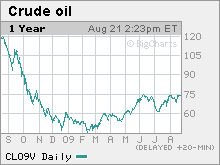Oil slips on higher supply
Lower stock prices also place downward pressure on crude prices, outweighing economic data.
LONDON (Reuters) -- Oil pared early gains to settle to below $72 a barrel on Wednesday, extending losses from the previous session as rising stockpiles of U.S. crude outweighed positive economic data.
U.S. crude for October delivery fell 62 cents to settle at $71.43 a barrel. Earlier on Wednesday, prices had bounced to $72.64, before turning lower. Oil fell $2.32 a barrel on Tuesday.
The U.S. Energy Information Administration (EIA), the statistical arm of the Department of Energy, reported on Wednesday that crude stocks in the world's largest energy consumer rose by 200,000 barrels last week.
While the build in crude stocks was no where near as large as the 4.3 million rise reported by the American Petroleum Institute on Tuesday, it still confounded initial market predictions for a 1.1 million barrel drop.
"We remain in a situation of massive over-supply, which is off the charts, but it does appear to be peaking," Summit Energy analyst Brad Samples said.
Gasoline stocks fell by 1.7 million barrels last week according to the EIA, against expectations for a smaller 1 million barrel drop, while distillates rose by 800,000 barrels compared with predictions for a 300,000 barrel build.
Investors took the opportunity to lock-in profits on Tuesday after crude touched the key psychological $75 mark for the first time since last October, crowning a near 130% jump in prices from the lows at the turn of the year.
Some analysts said the failure to break through the key level may signal that prices have topped out, with demand for oil still depressed by the global economic slowdown and signs of a broad recovery still murky.
"The price action of the past 24 hours would appear to favor additional price declines," said Jim Ritterbusch, president of Ritterbusch & Associates, adding the failure to break the $75 level could see prices fall by as much as $10.
Prices took some support from U.S economic data released on Wednesday showing a mild recovery in the housing market, but earlier data on durable goods orders suggested lingering weakness in the manufacturing sector.
Equity markets were mixed with Wall Street edging higher while European bourses generally dipped, highlighting the uncertainty surrounding the economic outlook.
Oil analysts said a lot of the positive economic data had already been factored into the price of crude by traders, while global inventories of crude remain at very high levels.
Venezuela's oil minister Rafael Ramirez said OPEC is unlikely to raise output at its September meeting, despite concerns from some quarters that oil prices are too high for a still fragile global economy.
"Inventories have declined but they remain above average. We need for them to come down to the average levels," Ramirez said.
Another member of the Organization of the Petroleum Exporting Countries, Iran, said oil demand was set to increase next year by up to 1 million barrels per day after this year's sharp decline. ![]()



